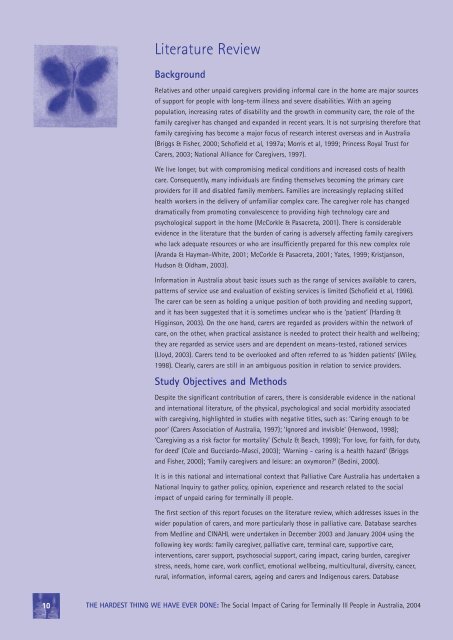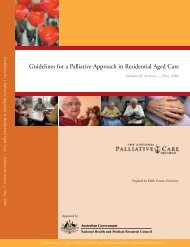The hardest thing we have ever done - Palliative Care Australia
The hardest thing we have ever done - Palliative Care Australia
The hardest thing we have ever done - Palliative Care Australia
You also want an ePaper? Increase the reach of your titles
YUMPU automatically turns print PDFs into web optimized ePapers that Google loves.
Literature Review<br />
Background<br />
Relatives and other unpaid caregivers providing informal care in the home are major sources<br />
of support for people with long-term illness and s<strong>ever</strong>e disabilities. With an ageing<br />
population, increasing rates of disability and the growth in community care, the role of the<br />
family caregiver has changed and expanded in recent years. It is not surprising therefore that<br />
family caregiving has become a major focus of research interest overseas and in <strong>Australia</strong><br />
(Briggs & Fisher, 2000; Schofield et al, 1997a; Morris et al, 1999; Princess Royal Trust for<br />
<strong>Care</strong>rs, 2003; National Alliance for <strong>Care</strong>givers, 1997).<br />
We live longer, but with compromising medical conditions and increased costs of health<br />
care. Consequently, many individuals are finding themselves becoming the primary care<br />
providers for ill and disabled family members. Families are increasingly replacing skilled<br />
health workers in the delivery of unfamiliar complex care. <strong>The</strong> caregiver role has changed<br />
dramatically from promoting convalescence to providing high technology care and<br />
psychological support in the home (McCorkle & Pasacreta, 2001). <strong>The</strong>re is considerable<br />
evidence in the literature that the burden of caring is adversely affecting family caregivers<br />
who lack adequate resources or who are insufficiently prepared for this new complex role<br />
(Aranda & Hayman-White, 2001; McCorkle & Pasacreta, 2001; Yates, 1999; Kristjanson,<br />
Hudson & Oldham, 2003).<br />
Information in <strong>Australia</strong> about basic issues such as the range of services available to carers,<br />
patterns of service use and evaluation of existing services is limited (Schofield et al, 1996).<br />
<strong>The</strong> carer can be seen as holding a unique position of both providing and needing support,<br />
and it has been suggested that it is sometimes unclear who is the ‘patient’ (Harding &<br />
Higginson, 2003). On the one hand, carers are regarded as providers within the network of<br />
care, on the other, when practical assistance is needed to protect their health and <strong>we</strong>llbeing;<br />
they are regarded as service users and are dependent on means-tested, rationed services<br />
(Lloyd, 2003). <strong>Care</strong>rs tend to be overlooked and often referred to as ‘hidden patients’ (Wiley,<br />
1998). Clearly, carers are still in an ambiguous position in relation to service providers.<br />
Study Objectives and Methods<br />
Despite the significant contribution of carers, there is considerable evidence in the national<br />
and international literature, of the physical, psychological and social morbidity associated<br />
with caregiving, highlighted in studies with negative titles, such as: ‘Caring enough to be<br />
poor’ (<strong>Care</strong>rs Association of <strong>Australia</strong>, 1997); ‘Ignored and invisible’ (Henwood, 1998);<br />
‘<strong>Care</strong>giving as a risk factor for mortality’ (Schulz & Beach, 1999); ‘For love, for faith, for duty,<br />
for deed’ (Cole and Gucciardo-Masci, 2003); ‘Warning - caring is a health hazard’ (Briggs<br />
and Fisher, 2000); ‘Family caregivers and leisure: an oxymoron?’ (Bedini, 2000).<br />
It is in this national and international context that <strong>Palliative</strong> <strong>Care</strong> <strong>Australia</strong> has undertaken a<br />
National Inquiry to gather policy, opinion, experience and research related to the social<br />
impact of unpaid caring for terminally ill people.<br />
<strong>The</strong> first section of this report focuses on the literature review, which addresses issues in the<br />
wider population of carers, and more particularly those in palliative care. Database searches<br />
from Medline and CINAHL <strong>we</strong>re undertaken in December 2003 and January 2004 using the<br />
following key words: family caregiver, palliative care, terminal care, supportive care,<br />
interventions, carer support, psychosocial support, caring impact, caring burden, caregiver<br />
stress, needs, home care, work conflict, emotional <strong>we</strong>llbeing, multicultural, diversity, cancer,<br />
rural, information, informal carers, ageing and carers and Indigenous carers. Database<br />
10 THE HARDEST THING WE HAVE EVER DONE: <strong>The</strong> Social Impact of Caring for Terminally Ill People in <strong>Australia</strong>, 2004
















